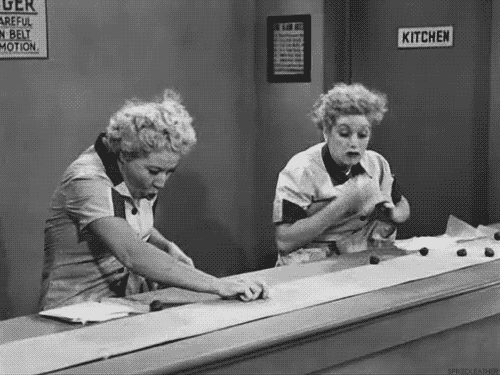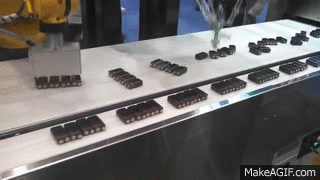There’s no denying Kevin Kelly is a techno-optimist, something his new book, The Inevitable, speaks to. The Wired cofounder, who returned to Russ Robert’s podcast, EconTalk, to promote the title, said three years ago when guesting on the program: “We’re constantly redefining what humans are here for.” He’s further developed his thinking on that topic this time around.
I agree with Kelly and Roberts that our new tools and systems (Deep Learning, AI, etc.) will make us better off in the long run (though it will be complicated), but I’m concerned about the near- and medium-term, when industries will likely rise and fall with disquieting regularity and financial headaches may find those who aren’t, say, successful authors or research fellow at the Hoover Institution.
Roberts briefly puzzles over people concerning themselves with technological unemployment at a time when the U.S. unemployment rate hovers around 5%. I don’t think it’s Trumpian to say that percentage doesn’t quite speak to the number of citizens struggling nor the long-stagnating wages. Wikipedia and smartphones are wonderful, but they’re not quite a substitute for a degree of economic security.
Two exchanges are embedded below.
Russ Roberts:
Just to play pessimist for a minute: We think about artificial intelligence, for example, today–and you mention both these kind of things in your book–is it really that exciting that our thermostat gets to know us? Is it really that exciting that my car beeps at me when I’m going out of my lane or can parallel park–which is great for my 16-year old worried about is his driver’s license test? But these are not transformative applications.
Kevin Kelly:
Yeah. This too. It seemed it at first, very invisible. Well, you might not recall, but in the 1920s or something Sears Roebuck, the mail-order catalog company, was selling the Home Motor. And the Home Motor was this immense, 15-pound motor that was going to sit in the center of your home and automate all the appliances and whatnot in your home. That industrial revolution thing worked because it became invisible–we don’t have the big motor turning everything; we have like 50 motors in our homes that became invisible. So, to some extent, this stuff is working because we don’t see it. Because it’s not something that is visible. And it succeeds to the extent that it transforms while we don’t see it. So, that’s one thing. And the second thing I would say about that is that, we’re sitting on this huge wave of the First Industrial Revolution which brought this incredible prosperity to us all, the fact that we see around us that we no longer in the agricultural hunter-gatherer era were–we had to do everything with human muscle or with animal muscle, animal power. We invented something called ‘synthetic artificial power.’ And we harnessed fossil fuels, and carbon fuels, to give additional power that we couldn’t do. And all that we see is basically a result of this artificial power. So when we drive down the road in your car, you have 250 horses working for you at that moment. Just turn a little knob, you’ve got 250 horses powering you down to do whatever you want to do. And then we distributed that power through a grid to every home and farm in the country; and so farmers could employ that artificial power to do all kinds of things; and factories could use that artificial power. And everything that we had built around us was because of the artificial power that we made. Well, now, we’re going to do the same thing with artificial intelligence. So, instead of–in addition to having 250 horses driving you down the road, you are going to have 250 minds–which we are going to get from AI, from artificial intelligence. And that, we’re also going to put that onto a grid and distribute it around the country so that like any farmer could just get and purchase as much artificial power and artificial intelligence as they want, to do things. And just as that artificial power, was this incredibly transformative, incredibly progressive, incredibly powerful platform to give us all that we enjoy now, this artificial minds that we are going to get on top of the artificial power is going to transform us in an equal way: it’s going to touch everything that we do. And I think actually it will transform us more than that first Industrial Revolution did.•
Russ Roberts:
A lot of people worry about the impact of artificial intelligence on employment. We’ve talked about this–it’s now becoming a recurring theme. And of course it’s ironic we’re having this theme when unemployment in the United States is 5%. But, put that to the side. I think people are legitimately worried about what might be replaced by what. And you talk about it at length. I just wondered about two points you make. You talk about the fact that there are jobs that we didn’t know we wanted done. I’m going to read a little excerpt here:
Before we invented automobiles, air-conditioning, flat-screen video displays, and animated cartoons, no one living in ancient Rome wished they could watch cartoons while riding to Athens in climate-controlled comfort. One hundred years ago not a single citizen of China would have told you that they would rather buy a tiny glass slab that allowed them to talk to faraway friends before they would buy indoor plumbing, but every day peasant farmers in China without plumbing purchase smart phones. Crafty AIs embedded in first-person-shooter games have given millions of teenage boys the urge, the need, to become professional game designers–a dream that no boy in Victorian times ever had. In a very real way our inventions assign us our jobs.You want to add anything to that?
Kevin Kelly:
I think maybe I kind of maybe say it this way: Our jobs into the future will be to invent jobs that we can automate and give to the robots. So, we’re on a kind of a path, on an escalator–that we’re going to keep inventing new things that that we desire to be wanted to do; we’ll figure out how to do them, and once we figure out how to do them we’ll automate them–basically giving them to the AIs, and a box. So, in a certain sense our job is to invent jobs that we can automate. And I think that part of inventing jobs may be our job–human job–for a while, because we have better access to our latent desires than AIs do. Although eventually even perhaps that job is–at least assisted by AIs.
Russ Roberts:
I’m going to read another quote which says what you just said, but it’s so beautiful. You say,
When robots and automation do our most basic work, making it relatively easy for us to be fed, clothed, and sheltered, then we are free to ask, “What are humans for?” Industrialization did more than just extend the average human lifespan. It led a greater percentage of the population to decide that humans were meant to be ballerinas, full-time musicians, mathematicians, athletes, fashion designers, yoga masters, fan-fiction authors, and folks with one-of-a kind titles on their business cards. With the help of our machines, we could take up these roles; but of course, over time, the machines will do these as well. We’ll then be empowered to dream up yet more answers to the question “What should we do?” It will be many generations before a robot can answer that.•
Tags: Kevin Kelly, Russ Roberts


